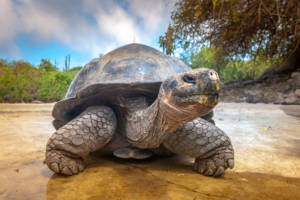
Studying the Turtle Island story leads to some fascinating discoveries about both Indigenous peoples from the past as well as those in North America today.
Long before Canada became the country we know, Indigenous peoples flourished across the North American continent. From the Mi’kmaq groups near the shores of Cape Spear, to the Tlingit living around Mount Saint Elias, many distinct cultures descended from this land’s earliest inhabitants. As they developed into the Inuit and First Nations civilizations that were present when Europeans first arrived, some of these cultures told creation stories about a land known as Turtle Island. Studying the Turtle Island concept and story leads to some fascinating discoveries about both Indigenous peoples from the past, as well as those in North America today.
The Origins of Turtle Island
Multiple Indigenous civilizations told stories in which the known world was called “Turtle Island.” The Turtle Island Native Network retells one common version from the Onondaga, one of the five original Iroquois nations. In many versions of the story, the ancient world is entirely comprised of oceans. Sky Woman falls through a hole in the heavens that was left behind from an uprooted tree. In their attempt to save her life, the creatures living in Earth’s waters dive deep beneath its surface to retrieve some dirt upon which she can stand. Turtle volunteers to carry the dirt on his back, completing Sky Woman’s rescue.
While the Iroquois versions are the most widely known, several other cultures’ mythos also contain Turtle Island stories:
- The Lenape people of the Northeastern Woodlands region
- Anishinaabe civilizations such as the Ojibwe and Potawatomi, and Algonquin
- Cheyenne cultures in the Great Plains region of the United States
While the concept of a massive turtle carrying the world on its back can also be found in older Sanskrit and Chinese texts, it holds the most prominent place among Indigenous American groups. Furthermore, the Mayans developed a similar myth about Zipacna, a conceited and violent oversized crocodile thought to carry their land on his back and cause volcanic and seismic activity as he moved. In contrast, Turtle Island legends tend to portray the giant turtles as helpful, benevolent beings.
Turtle Island in a Modern Context
Within the last few decades, “Turtle Island” has grown beyond a concept from Indigenous mythology and morphed into one with deeper symbolic meaning. Citing the desire to reclaim older cultural roots and acknowledge the sovereignty of Native civilizations prior to European colonialism, some use the term Turtle Island instead of North America. The America name originally derived from Italian explorer Amerigo Vespucci, but there were Native civilizations living in these lands long before Vespucci started exploring. The Manataka American Indian Council explains that some Indigenous people also use the term “Niiji” to refer to themselves in place of the word “Indian,” the latter being a moniker mistakenly given to Natives by Europeans believing that they’d landed in India.
The term “Turtle Island” has fallen into more widespread use as it’s being increasingly linked to Indigenous civil rights and environmental activism. One example mentioned in a June 2017 CBC article cites a grassroots group of First Nations activists mentioning “a crisis situation…on Turtle Island.” The activists staged a protest, calling for Canadians to address deeper issues from assimilation, colonization, and colonialism as Canada Day approached. Additionally, Native organizations such as the Indigenous Environmental Network and initiatives like the Turtle Island Solidarity Journey continue to focus on solutions to climate change while drawing attention to their connections to colonialism and environmental racism.
An Old Legend With New Interpretations
Indigenous cultures across North American either developed their own cosmogonic mythos to explain the universe’s origins or borrowed these beliefs from their neighbors. Within many of these civilizations, Turtle Island began as a creation story. With the impacts of European colonialism leading to both modern environmental concerns and civil rights issues, Turtle Island now holds potent symbolic meaning for many Indigenous people today.


